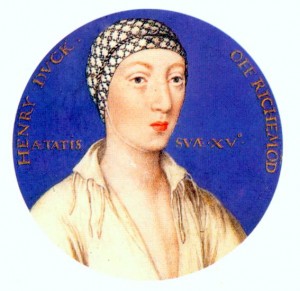
It was the way of the Tudor court, as men fell from favour others were waiting in the wings to mop up the crumbs and gain from their fall. It seems brutal to us today, but I guess it’s human nature; there are always people looking to see how they can gain from another’s misfortune.
While Queen Anne Boleyn, musician Mark Smeaton and courtiers Sir Henry Norris, Sir Francis Weston, William Brereton, George Boleyn, Sir Richard Page and Sir Thomas Wyatt were locked up in the Tower of London awaiting their fate, other courtiers were already clamouring over the spoils that might result from the demotions or deaths of these people. In my book on Anne’s fall, I liken them to vultures circling above a corpse or the Roman soldiers casting lots over the clothes of Jesus Christ and I think the similes are quite apt. These vultures, who included Sir Henry Fitzroy, Lord Lisle and lawyer Richard Staverton, didn’t care about what was happening to Anne and the men, their eyes were on the prizes: the money, lands and offices that they may be able to secure for themselves. How fickle Henry VIII’s court was.
So what were these men rubbing their hands with glee over?
Well, Lord Lisle wasn’t fussy. He wrote to Thomas Cromwell on 8th May 1536 simply pointing out that Cromwell could pass some “things” onto him:
“And seeing there are many things now in his gracious disposition and hands by reason of the most mischievous, heinous, and most abominable treasons against his most gracious and royal Crown and person committed, I wholly trust that his Grace, being good lord unto me, will vouchsafe to employ some part of those same upon me, which I do well know may so much the rather be obtained by your good mediation and furtherance.”1
Richard Staverton, a lawyer and landowner of Warfield, Berkshire, who may have been related by marriage to Sir Francis Weston, was after some of Sir Henry Norris’s lands; his excuse being that he had fourteen children to provide for. He wrote to Cromwell on 2nd May so he was quick off the mark:
“It pleased you to write to me of your good will to my preferment. Various offenders have been committed to the Tower, among others Master Henry Norris, who has various rooms in the parts about me near Windsor, for which I hope you will have me in remembrance. He has the Little Park, the Park of Holy John (Foly John), Perlam (Perlaunt) Park, and the room of the Black Rod, in Windsor Castle, which I shall be glad to have, as I have 14 children.”2
Sir Henry Fitzroy, Duke of Richmond and the illegitimate son of Henry VIII, was after an office held by Sir Henry Norris. On 8th May, he wrote to John Longland, Bishop of Lincoln making enquiries about the post:
“As the stewardship of Banbury is like shortly to be vacant in consequence of Mr. Norres’ trouble (many men thinking that there is no way but one with him,) asks the Bishop for a grant thereof under the chapter seal, that he may exercise the office by his deputy Gyles Forster, master of his horse, the bearer. London, 8 May”3
Richmond, however, was not quick enough; a letter from the Bishop to Thomas Cromwell on 5th May 1536 shows that Cromwell had already been offered it:
“If it is true that Norrys has not used himself according to his duty to his sovereign lord, offers Cromwell the stewardship of the University of Oxford, if he will accept so small a fee as 5l. When the duke of Suffolk exchanged his lands in Oxfordshire with the King, he gave up the stewardship of Banbury to the behoof of Norris, on condition that in the new grant to Norris he might be joined with him for the longest liver. Advises Cromwell to ask the Duke to give up his interest in it. The fee is only 6l. 13s. 4d. Will then give Cromwell a new patent.”4
As I said in my previous article in this subject, and also in my book, the way that these men were clamouring over the spoils makes you wonder if there was any chance of justice for Anne and the men. Richmond, Lisle and Staverton seem to have considered their fates a done deal. Wyatt and Page survived though.
Notes and Sources
- LP x. 829
- Ibid., 791
- Ibid., 891
- Ibid., 804